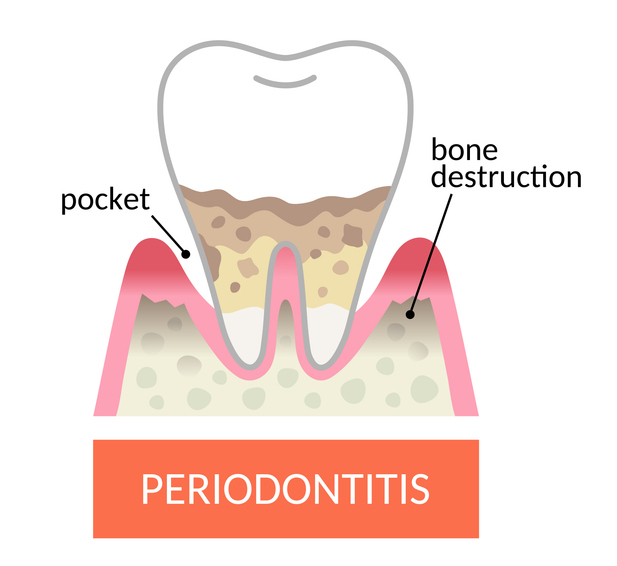
Pocket reduction surgery, also known as flap surgery, is a procedure designed to combat the effects of advanced gum disease. When gum disease progresses, it can create deep pockets between the teeth and gums, allowing bacteria to thrive and cause further damage. Pocket reduction surgery aims to reduce the depth of these pockets, making it easier to clean the teeth and gums and preventing further progression of the disease. Managing gum disease early through treatments like pocket reduction surgery is crucial to preventing more serious complications, such as bone loss and tooth loss.
Understanding the Need for Pocket Reduction Surgery
As gum disease advances, the gums can pull away from the teeth, creating spaces known as periodontal pockets. These pockets become a breeding ground for bacteria, which continue to destroy the gums and bone surrounding the teeth. As the pockets deepen, they become increasingly difficult to clean with regular brushing and flossing, allowing bacteria to multiply unchecked.
The formation of periodontal pockets is a critical turning point in the progression of gum disease. If left untreated, these pockets can lead to severe bone loss, which jeopardizes the stability of the teeth. Over time, the supporting bone structure can deteriorate to the point where teeth become loose and may eventually need to be removed. Pocket reduction surgery is a proactive step in managing gum disease by reducing the pocket depth, removing bacteria, and preventing further damage to the gums and bone.
The Pocket Reduction Surgery Procedure
Understanding what to expect during pocket reduction surgery can help alleviate any concerns and prepare you for the procedure. Here’s a step-by-step description of how our team performs this surgery:
- Initial Consultation and Examination: Before the surgery, a thorough examination is conducted to assess the severity of the gum disease and the depth of the periodontal pockets. X-rays may be taken to evaluate the health of the bone supporting the teeth. Our team will discuss the treatment plan with you, explaining the procedure and answering any questions you may have.
- Preparation and Anesthesia: On the day of the surgery, the area will be numbed using a local anesthetic to ensure your comfort. The team at Implant & Perio Center of Kansas is dedicated to making the experience as comfortable as possible for our patients.
- Surgery: Dr. Sams will gently fold back the gums to remove the bacteria and tartar that have accumulated in the deep pockets. Any infected or damaged tissue will be removed. In some cases, the underlying bone may need to be smoothed or recontoured to allow the gums to reattach more effectively to healthy bone. Once the cleaning is complete, the gums are sutured back into place, reducing the depth of the pockets.
- Post-Surgery Care: After the surgery, it’s essential to follow the post-operative care instructions provided by Dr. Sams. This includes managing any discomfort with prescribed medications, avoiding certain foods, and maintaining excellent oral hygiene. You may need to use a special mouth rinse to help control bacteria and prevent infection.
Benefits of Pocket Reduction Surgery for Gum Disease Management
Pocket reduction surgery offers several significant benefits for managing gum disease and maintaining oral health:
- Reduction in Pocket Depth: By reducing the depth of the periodontal pockets, the surgery makes it easier for you to keep your teeth and gums clean. This reduction minimizes areas where bacteria can hide and multiply, reducing the risk of further infection and damage.
- Prevention of Bone Loss and Tooth Loss: Pocket reduction surgery can help halt the progression of gum disease and prevent the loss of bone that supports your teeth. By addressing the issue early, you can maintain the health of your gums and the stability of your teeth, avoiding the need for more invasive procedures in the future.
- Improved Oral Health and Overall Well-being: Healthy gums are essential for a healthy mouth. By treating gum disease effectively, you can enjoy improved oral health, better breath, and a more confident smile. Additionally, maintaining good oral health is linked to better overall health, as untreated gum disease has been associated with other systemic conditions like heart disease and diabetes.
Long-Term Care and Prevention After Pocket Reduction Surgery
While pocket reduction surgery is an effective treatment for gum disease, it’s important to maintain a comprehensive oral care routine to prevent the recurrence of the condition. Here are some key steps for long-term care after surgery:
- Regular Dental Check-ups and Cleanings: Regular visits are crucial for monitoring your oral health and catching any signs of gum disease early. Professional cleanings can remove plaque and tartar that regular brushing and flossing might miss, helping to keep your gums healthy.
- Maintaining Healthy Gums Post-Surgery: Following a diligent oral hygiene routine is essential for preventing the return of gum disease. Brush at least twice a day with a soft-bristled toothbrush, floss daily, and consider using an antimicrobial mouthwash to reduce bacteria in your mouth.
- Comprehensive Oral Hygiene Routine: Beyond brushing and flossing, it’s important to maintain a healthy lifestyle. A balanced diet, avoiding tobacco products, and managing underlying health conditions like diabetes can all contribute to healthier gums and teeth.
At Implant & Perio Center of Kansas, our team is dedicated to helping you achieve and maintain optimal oral health. If you are experiencing symptoms of gum disease or have been advised to undergo pocket reduction surgery, we are here to provide expert care and support. Contact us today to schedule an appointment and take the next step toward a healthier smile.
